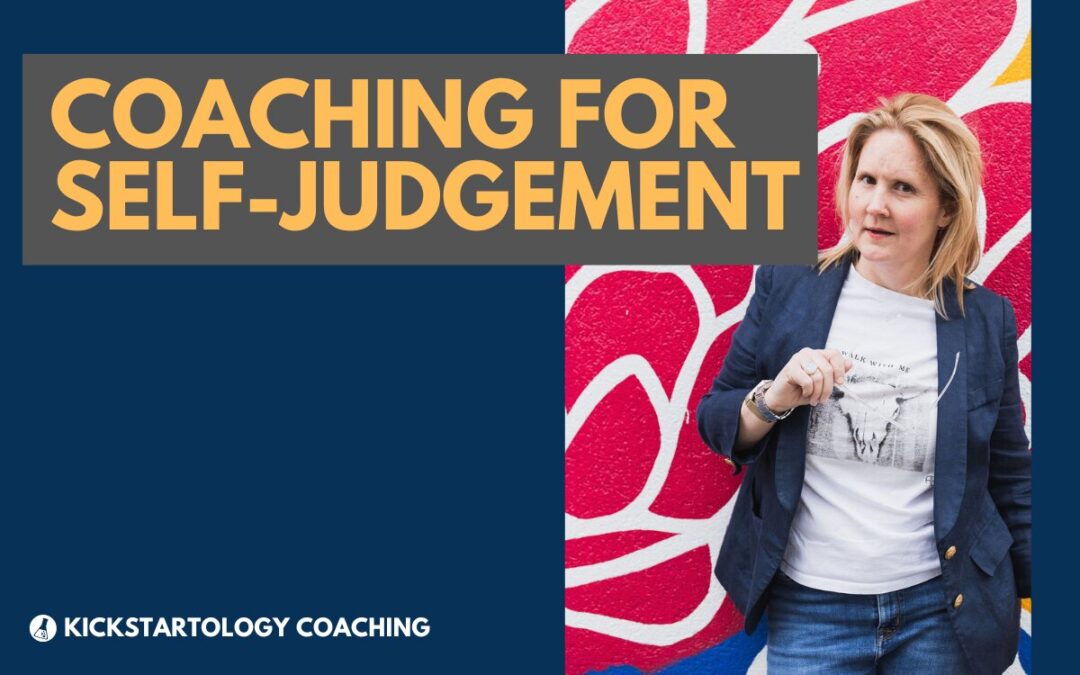Is Being Hard on Yourself Working?
Self-judgment is #3 on our list of the top 10 ways that intelligent women get in their own way.
You might think that you have to be hard on yourself because you know you can improve, and self-acceptance and self-compassion aren’t practical.
You may believe that self-compassion is just feel-good fluffy stuff for people to address in therapy.
You might think that being hard on yourself is going to drive you, but the negative impact of self-judgement makes it more difficult to change what you aren’t satisfied with.
But the scientific truth is, that being hard on yourself causes more harm than good.
Replacing self-judgement with self-acceptance and self-compassion won’t lead to complacency or settling for less than you are capable of.
It’s a little counter-intuitive at first, but you can demand a lot from yourself and expect yourself to do hard things while simultaneously practicing self-compassion and self-acceptance. This is going to save you from so much exhausting mind drama and leave you with more time and energy to get on with things.
Being hard on yourself is a form of self-judgement and it’s harmful for several reasons:
- Self-judgment can hurt motivation.
- Our brain has a negativity bias and when we engage in self-judgment, we are focusing on our perceived flaws and failures and are less likely to have an accurate self-assessment.
- Chronic self-criticism can lead to the release of stress hormones like cortisol, which have negative health effects.
- Self-judgement disrupts self-compassion and self-acceptance.
Self-Acceptance and Self-Compassion
Self-acceptance and self-compassion aren’t just feel-good fluff. They can increase our resilience to adversity, reduce stress, and make us more likely to have healthy relationships (as we are less likely to be defensive, anxious, or resentful).
Practicing self-acceptance, accepting and acknowledging one’s strengths, weaknesses and overall identity without judgment, is the habit that corresponds most closely with us being satisfied with our lives overall.
Self-compassion, being kind and understanding towards oneself, especially during difficult times or when facing personal failures, helps to better regulate emotional responses to stress.
Research has shown that self-compassion and self-acceptance can be trained through mindfulness-based interventions and this is associated with changes in brain activity and improved emotional well-being.
How to Reduce Self-Judgement 101
1. Identify your triggers
These are the situations, people, or thoughts that tend to trigger your inner critic and make you feel inadequate, ashamed, or unworthy. Common triggers can include social comparison, perfectionism, past failures, or personal insecurities.
2. Challenge your thoughts
SPOILER: Your thoughts are not facts. When negative thoughts pop up, challenge them with evidence to find out why these are just opinions, not facts. Instead of criticizing yourself, focus on what you want to achieve and how you can do it.
3. Practice self-compassion and don’t be an asshole to yourself
4. Spend time with people who support and encourage you.
5. Celebrate all wins (even small ones) and practice gratitude (brain training).
6. Evaluate your results consistently.
Accept your flaws and mistakes, and focus on progress, not perfection. our coaching program, we give you the tools to notice where you’re at currently, decide where you want to get to, and how to measure your progress.
Remember, overcoming self-judgement is a process, and it’s okay to be patient with yourself.
This Shit Works
In the Kickstartology Coaching Program, we teach you simple and powerful tools to reduce any self-judgement habits that are getting in your way and build up self-acceptance and self-compassion. If being hard on yourself worked, we would teach you that, but it only slows you down.
This is the perfect time to get on the path that you really want to be on and find out what you’re actually capable of. We’re going to help you do it in a way that works with your life, and keep you committed to yourself. Because you already know that more is possible.
P.S. If you want some help figuring out the next part, book a free coaching exploration call. We’ll talk about what’s going on and figure out if it fits. No pressure. Just clarity.
Not ready to talk?
Start with my FREE mini starter course:
KICKSTART: THE FIRST STEP
Make the decision that changes everything else.
Clarity, commitment, and forward motion. Ten minutes a day. Starting now.
How to Manifest a Safari?
The Idea from Nowhere I have a complicated relationship with the whole "manifesting" thing. At the risk of sounding cheesy, I think of it as the little spark of magic that seems to bring things together when you commit to an idea with your full heart without getting...
How to Stop Being Hard on Yourself – ADHD
Don’t have time? The brief: If you have ADHD, being hard on yourself can feel necessary, but it's just a pattern your brain has practiced for years. Self-compassion doesn't mean giving up. It means being honest enough to stop making things harder. Catching it, zooming...
I’m Feeling Untethered, and So Are a Lot of Smart Women I Know
Don’t have time? The brief: Safe mode can become a long-term habit that looks functional but quietly disconnects you from yourself. Drifting often happens gradually, through familiar routines that seem harmless until they flatten everything. Reconnection starts when...







